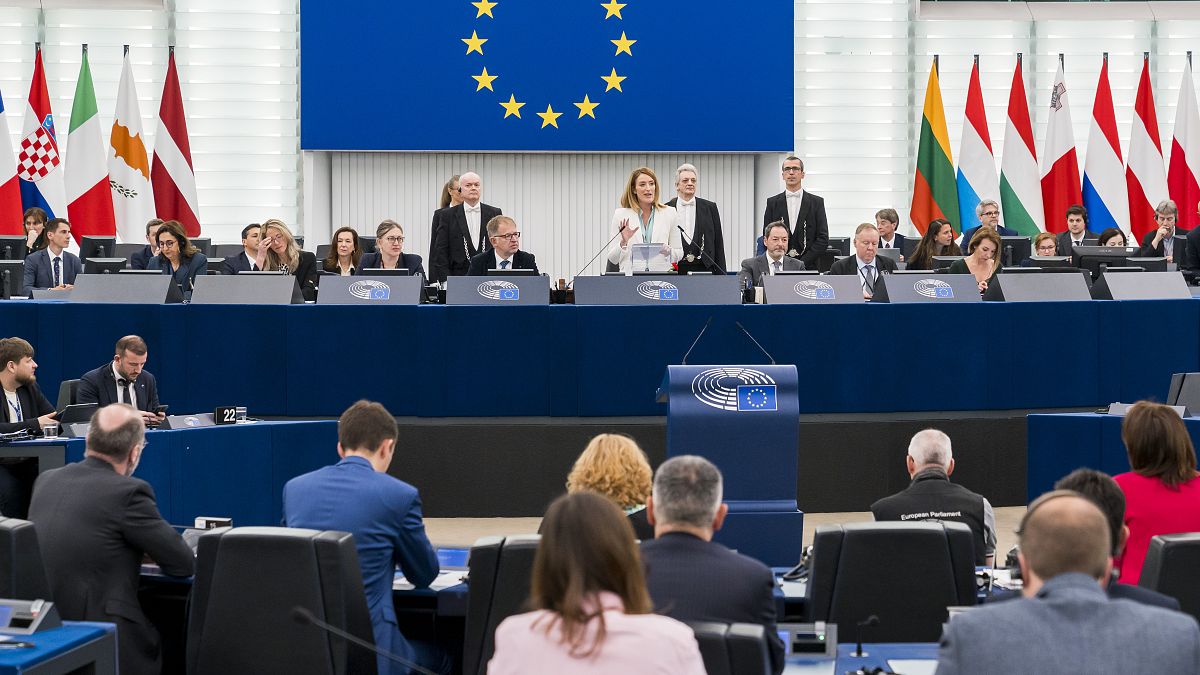With the European Parliament election less than two weeks away, its incoming members will still not have official parental leave recognised, which could prevent young people from running for office.
The European Parliament is the most equal parliament in the bloc, with around 40% women MEPs in 2024, compared to almost 16% in 1979. Still, EU lawmakers can’t claim parental leave, can’t vote remotely, and can’t appoint a temporary replacement.
“If we want a gender-balanced system where fathers, not just mothers, can combine childcare and political activity, we need to recognise the right to a family life,” Raquel García Hermida-van der Walle, candidate for the EU elections in The Netherlands for D66 (Renew Europe), told Euronews.
Current electoral laws and the European Parliament’s internal rules don’t envisage the possibility for temporary MEP replacements for maternity, paternity or parental leave nor may votes be transferred by proxy to another member.
In 2022, the Parliament adopted a proposal for a regulation on the election of MEPs which would introduce this possibility. However the proposal remains stalled with the council two years later.
“Parental leave is not about making elected representatives’ mandate more comfortable. It’s about ensuring the continuity of a mandate conferred by the people to represent them,” MEP Leïla Chaibi (France/The Left) told Euronews.
Chaibi is one of 13 MEPs who last year called for the EU institution to reform its rules to adapt to modern times in a manifesto signed by Parliament President Roberta Metsola (Malta/EPP).
Following the manifesto, Metsola introduced a specific provision for MEPs on maternity leave who missed votes, making the reason for their absence transparent.
From now on, an asterisk next to MEPs’ names will indicate those who can’t attend votes due to maternity, paternity or parental leave – but further measures are still to come.
One of the main asks of the manifesto was the introduction of provisions to enable remote voting, a system already installed and used during the COVID-19 pandemic.
According to the European Parliament’s press services, Metsola has been looking into the possibility of extending use for MEPs on maternity, paternity or parental leave with an internal working group on information and technology innovation strategy.
In a letter dated 2 April 2024, the working group concluded that the introduction of hybrid voting in plenary raises a number of technical, organisational and procedural challenges that need to be further assessed.
The group identified the authentication method, the quality of the remote network connection and the real-time nature of the voting process as the main challenges.
The potential solutions identified were seen as risky even if applied to a small number of voters and as a threat to the essential trust provided by the current voting system.
“This [lack of parental leave] does not encourage the participation of young people or people starting their family life, especially women,” García Hermida said, adding that “you might think twice about running if you are a young politician and you want to have children, or if you have just had children”.
But the EU institution argues that, regardless of gender, no “leave authorisation” is necessary or possible, as MEPs organise the exercise of their free mandate themselves.
“The European Parliament has facilities in Brussels, Luxembourg and Strasbourg to allow parents to work leaving their children in adapted family rooms,” a Parliament spokesperson told Euronews when asked whether they were planning any internal reforms.
For the French left-wing lawmaker, who last year became a mother, the absence of reforms raises a problem of representation.
“This lack of measures does not encourage young people, especially women, to stand for election,” Chaibi argued.
In fact, the average age of an MEP in May 2024 is 53 years old, and only three of them are under 30 years old.
The Parliament said it will keep looking for possible solutions to this issue during the next mandate, as 14 member states already explicitly entitle MEPs to these leave arrangements, including Belgium, Germany, Italy and Sweden.
In Germany, members of the Bundestag are entitled to up to six weeks of maternity leave before the birth of a child and a further eight weeks after, while in Spain, although not officially recognised, MPs can vote remotely while they are absent from parliament.
“The European parliament should be an example of what we expect from companies and citizens,” said Chaibi, who is standing for re-election. “By not taking any action to replace elected representatives on parental leave, the EU institution is sending out the wrong signal”.

